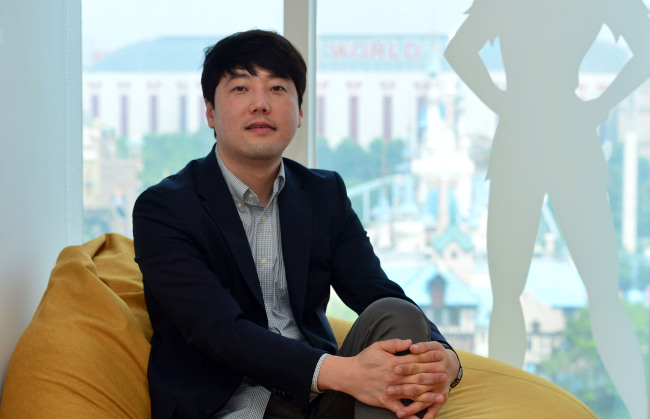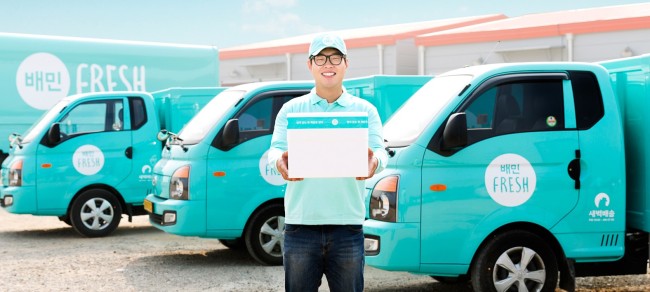Breakfast is a big part of Korean life, the family gathering for a proper sit-down breakfast that would set you off right for the day. Or that used to be the case.
These days, such scenes seem to happen only on television. Many students and working people skip breakfast entirely or grab something to eat on the go as they rush out the door. In fact, for most people, a full breakfast is a luxury savored only on the weekends, if at all.
Out to change this unhealthy lifestyle is Cho Sung-woo, CEO of Baemin Fresh, a fresh food delivery service.
“Our aim is to give our customers the gift of time,” said Cho, 36, who likens his company’s business to regular milk deliveries in the morning, except Cho’s company delivers more than just milk.
About 3,000 items -- ranging from breakfast, baked goods, juice and banchan, or side dishes, can be ordered online and delivered home through Baemin Fresh. What sets this service apart from other similar services is that all deliveries are made before 7 a.m.
“The idea is that the customer will receive the food before leaving home in the morning,” said Cho.
Food delivery in Korea is not a revolutionary idea. Neighborhood Chinese restaurants and chicken places have been making home deliveries for decades. However, delivering breakfast and ensuring that it is delivered fresh is something that has not been successfully done before. It took much trial and error before Cho arrived at his winning business formula.
 |
Cho Sung-woo, CEO of Baemin Fresh, poses at his office in Seoul on Tuesday. (Yoon Byung-chan/The Korea Herald) |
Cho worked at the public relations department of Hyundai Heavy Industries, a major conglomerate, for five years before striking it out on his own. “I was working to communicate the founder Chung Ju-yung’s spirit, ‘have you tried?’ But five years on, I realized that I was not exercising that spirit,” he recalled.
On his birthday in August 2011, Cho turned in his resignation. He gathered his friends, all six of them also working at conglomerate companies, raised money by selling his studio apartment, and founded a delivery service business, Dum & Dummerce.
Things looked bright in the beginning, but within six to seven months, the company had used up its 150 million won ($130,891) in capital and the company struggled. In 2013, he launched a new subscription that focused on the delivery of items used frequently by working people.
“We delivered soy milk, nuts, razors, dress shirts, anything that busy working people needed replenishing on regular basis,” he recalled.
He then realized that people wanted delivery of fresh products and shifted his focus to a lifestyle service.
“There were certain conditions that needed to be met. The goods needed to be delivered in the morning before the customers left home for work. The goods needed to be delivered fresh. The service needed to be offered at regular intervals,” Cho said.
“The logistics system was nonexistent at the time. And then the ‘have you tried’ spirit kicked in. So, the two of us that remained with the company started delivering things by ourselves by car,” he said. “The first two years were a real struggle but I was determined to continue for another five years,” Cho said.
 |
A Baemin Fresh delivery person stands in front of a fleet of the company’s refrigerated trucks. (Baemin Fresh) |
That determination and the lessons from past failures paid off. In 2014, the company generated 2 billion won in sales, reaching a break-even point. By this time, the company had grown in size to 25 employees. “I still have a photo of myself carrying water bottles on my back to remind myself of how I got here,” Cho said.
In 2015, he decided to seek outside investment and in May that year, Woowa Brothers, which operates the food delivery app Baedal Minjok, acquired Cho’s company for some 10 billion won. The Woowa Brothers portfolio now consists of Baedal Minjok, the food delivery app that focuses on delivery of chicken, pizza and Chinese takeout, Baemin Fresh, which delivers fresh food between midnight and dawn hours, and Baemin Riders which delivers meals from well-known restaurants. Baemin’s motto is “Eating good food where you want to eat.”
Baemin Fresh’s core target is working moms in their 30s who are very discerning but are not price sensitive.
“They are very picky and demanding but what we do well in is enlist superior producers,” said Cho confidently. “With regular delivery service, we are able to predict demand. And this way, it is possible for us to grow together with our producers,” said Cho, explaining how it is a win-win business model. “Our goal is to meet the diverse needs of our customers with produce made by diverse players. The challenge is to find the right producers,” he said.
Currently, Baemin Fresh’s lineup of products come from the company’s private brand and regional producers in a fifty-fifty split. “We plan to maintain this ratio. One principle of our platform is that we do not discriminate,” said Cho, explaining that private brand products offer a bigger profit margin of 30 percent compared to the 15 percent commission the company receives from outside producers.
In fresh food delivery, Cho sees a market sector with a potential for great growth.
“Online sales of fresh food account for only 5 percent of the entire 7 trillion won to 10 trillion won food market,” Cho observed. “Once trust is established and value is created, that 5 percent can grow up to 50 percent. We have just begun taking baby steps.”
By Kim Hoo-ran (
khooran@heraldcorp.com)





![[Herald Interview] 'Trump will use tariffs as first line of defense for American manufacturing'](http://res.heraldm.com/phpwas/restmb_idxmake.php?idx=644&simg=/content/image/2024/11/26/20241126050017_0.jpg)


![[Health and care] Getting cancer young: Why cancer isn’t just an older person’s battle](http://res.heraldm.com/phpwas/restmb_idxmake.php?idx=644&simg=/content/image/2024/11/26/20241126050043_0.jpg)
